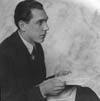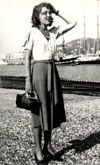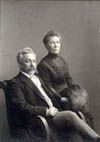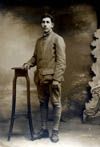André Beucler
French writer
1898 - 1985
A look at a life
(biographical milestones)
First part
|
|
| Foreword | ||
| 1898 - 1920 | Adolescence between St. Petersburg and Montbeliard | |
| 1920 - 1924 | Odd jobs |
|
|
|
A
French literary figure, a writer of memoirs, Andre Beucler was
born in St. Petersburg on 23rd February 1898. |
 |
 |
His
particularly rich biography makes it difficult to summarize. A
central feature of his private life was that he married the same
woman three times (1928 - 1945 - 1964). The beautiful Natacha,
born in Saint Petersburg in 1907, half Russian like him, she fascinated
fashionable Paris. Having met in France in 1927, they had two sons
from their successive unions, Serge and Roland. She outlived Beucler
by just one year.
As for "honours" - on which he set little value - it is important to say all the same that Beucler was, like Alexandre Vialatte and Marcel Ayme, an awardwinner of the Blumenthal Foundation, which, during the Twenties, was very prestigious, and that three times he missed the Goncourt although his editor had maintained high hopes - deep down this reassured them that his writing really was modern. However, although there was no getting away from the Rosettes of the Legion d'Honneur and of the Arts et Lettres, he accepted with pleasure in 1981 the Grand Prix de la Societe des Gens de Lettres for his entire work. |
|
|
|
|
To
speak of Beucler also means to become immersed in Central Asia where
he travelled with his parents during the long holidays. For the eight
year old child that he was, adventure did not only exist on coloured
maps of the atlas: Oural, The Caucasus, Turkestan and Samarkand,
he knew them first hand! While much younger even than his future
friend Cendrars, Beucler had "lived" Transsiberia as far
as Vladisvostock.
His father, Jules, a lutherian from Montbéliard stock, had been sent to Russia by the Quai d'Orsay to teach French at the Law School and the Imperial Military School for Cadet Officers. French was compulsory at that time. In St. Petersburg he married Marie, General Souvorkoff's daughter, and it is here that, on 23rd February 1898, Andre Beucler began his existence. He is still a child when his father organises his first trip by train from St. Petersburg to Belfort, alone with his brother who is a year younger. They become boarders first at the secondary school in Belfort and later in Besançon. Here, they engage in many sports; boxing, fencing, cycling and football. Andre is rowdy but brilliant. At the secondary school in Besançon, the young Andre Beucler was to have among other teachers Albert Thibaudet, already an influential critic. Thanks to him, Beucler would experience the "Giraudoux flash", would also discover Jules Romains, who, he admits, had a great influence on his own desire to write. |

|

|
In
1916 he enrols at the Sorbonne in Paris, but is called up in April
1917 to the heavy artillery. Wounded on the front, he is assigned
to a German prisoner camp in Charleville as interpreter until April
1920. Once discharged, he learns of his mother's death (3rd March
1920), shortly after her arrival as a refugee with his father in
the family house of Bondeval in the Doubs county, having lost everything
in Russia.
|
|
|
|
|
Beucler
dreamed of becoming a painter, but to make a living, has to do
a succession of odd jobs: by turns he is draughtsman, sells colour
postcards, is a salesman for quality paper, is in charge of the
correspondance for the Counter of Sheet-Metal and Plates, and becomes
secretary-general for the first university news newspaper. As their
correspondent to the Chamber of Deputies at the time of the well-known "latin
quarrel", he meets Leon Daudet and the Minister of Public
Instruction, Leon Berard.
He undertakes a series of important interviews: Anatole France, Maurice Barres, Paul Bourget, Henri Bergson, Anna de Noailles, who are already these "stars who have made their mark" on a century of change. And then he is sub-editor of Fantasio-Le-Rire, a great graphic era with Poulbot, Leandre, and the "young ones", Vertes, Chas Laborde, Dignimont, Sennep... |
|
|
|
|